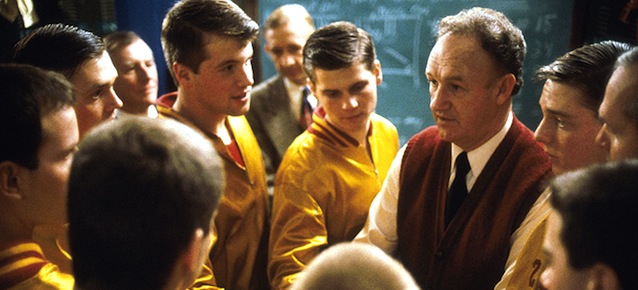
In part 1, we touched on the moment where Coach Dale experienced grace from i-dotting and t-crossing extraordinaire, Ms. Myra Fleener. This installment will focus on another unlikely, yet incredibly encouraging relationship in the classic 1986 film.
 The town of Hickory has a town drunk and his name is “Shooter” Flatch, who is also one of Coach Dale’s players’ father. Not only is Shooter an impossible alcoholic, he loves the game of basketball with endearing zeal, and has impressive insight into the sport. Coach Dale and Shooter have a very interesting (and hilarious) relationship. As noted in the last post, the suspicious town of Hickory gets extremely angry with Coach Dale’s “unconventional coaching methods”—Shooter didn’t. In fact, he’s the one of the only Hickory citizens who isn’t suspicious of the new coach. Shooter seems to recognize Coach Dale’s knowledge of the game, as well as the ways in which he is helpful for the players, on and off the court.
The town of Hickory has a town drunk and his name is “Shooter” Flatch, who is also one of Coach Dale’s players’ father. Not only is Shooter an impossible alcoholic, he loves the game of basketball with endearing zeal, and has impressive insight into the sport. Coach Dale and Shooter have a very interesting (and hilarious) relationship. As noted in the last post, the suspicious town of Hickory gets extremely angry with Coach Dale’s “unconventional coaching methods”—Shooter didn’t. In fact, he’s the one of the only Hickory citizens who isn’t suspicious of the new coach. Shooter seems to recognize Coach Dale’s knowledge of the game, as well as the ways in which he is helpful for the players, on and off the court.
Coach Dale and Shooter’s relationship consists of a few things: Shooter randomly showing up at the wee hours of the night to talk about basketball strategies with Coach, or Coach counseling Shooter’s son down from being upset with his drunk father, or Coach’s shoving Shooter’s face into a sink, telling him to sober up (all of which make me think of Eric Taylor as I write this). Coach’s friendship toward Shooter might seem conditional on the surface (“I’m your friend, only if you sober up, etc.”), but it’s not–just wait. Nonetheless, Coach Dale has an undeniable “soft spot” when it comes to Shooter.
An explicit moment, in which compassion is at the forefront, is when Coach Dale approaches Shooter at his home, asking him to be his assistant coach. Shooter responds with reluctance, and seems offended. Shooter’s not kidding anyone–his pride and fear is on full display in this scene. Later on, Shooter arrives to a game, in his suit, which he calls his “wing-dinger”—and Coach Dale introduces him as “our new assistant” to the team.
Coach Dale—being quite the hothead—is known for his technical fouls, and frequent rejections. Shooter knows this, telling Coach Dale: “You have to promise me you won’t get thrown out of no games.” Clearly, Shooter is afraid of coaching by himself, if and when in fact Coach Dale were to get ejected. With the town of Hickory’s unbelievably high expectations, who wouldn’t be?
In one scene, Coach Dale intentionally gets ejected from a game, in order to give Shooter a chance to coach by himself. Shooter is initially terrified. You can feel the tension in the air when Coach Dale instructs Shooter, “it’s up to you now.”
As the game continues to carry on, Shooter seems to believe in himself, or, rather, in whom Coach Dale has named him to be: the coach. Shooter bends down and tells the guys they’re going to run the infamous “picket fence” play—and it worked, Shooter coached the team and they won by following his own strategy. It worked.
But this moment isn’t about glory. The beauty of this scene is not in “winning” the game–it’s in the power of imputation–the power of giving someone another name—and its life-changing effects. Coach Dale didn’t say to his team: “Hey guys, Shooter here is an alcoholic. He might even be drunk right now for all we know, but he’s all we got. Now do what he says.” Coach doesn’t call him an alcoholic, or a bad father, or a dead-beat jobless bum. Dale calls him coach—and treats him as such throughout entire film.
Maybe Coach Dale reaches out to Shooter because he sympathized with him. Maybe, knowing his own mistakes (assaulting a player), Coach knew it was only a matter of time before the Hickory community would cast Shooter off as a leper. Nevertheless, his befriending Shooter is remarkably spontaneous. There isn’t an ulterior motive in being kind to Shooter. Shooter’s got nothing to offer back. There’s plenty of other people, who aren’t alcoholics in Hickory, who would be a more “reliable” assistant. Coach picked the drunk. In his treatise, On Christian Liberty, Martin Luther elaborated on the nature of love to one’s neighbor, which sheds some light on Coach Dale’s posture toward Shooter:
Behold, from faith thus flow forth love and joy in the Lord, and from love a joyful, willing, and free mind that serves one’s neighbor willingly and takes no account of gratitude or ingratitude, of praise or blame, of gain or loss. For a man does not serve that he may put men under obligations. He does not distinguish between friends and enemies or anticipate their thankfulness or unthankfulness.
Toward the end of the film, Shooter has a Romans 7 moment–another drunken escapade–and ends up in a hospital. Other than his son, Coach Dale is the only member of the Hickory community that visits Shooter.
There’s just something about the kind of love that isn’t concerned with feedback or return policies, and there’s certainly something to be said for the the effect(s) this kind of love has on people. Just look at Shooter’s facial expression at the end of this scene!
And Mbirds, don’t get caught watchin’ the paint dry!
[youtube http://www.youtube.com/watch?v=s11Ff8MktME&list=FLOn1zUyhGqEdeDL1ObvG9jA&w=600]

COMMENTS
Leave a Reply













